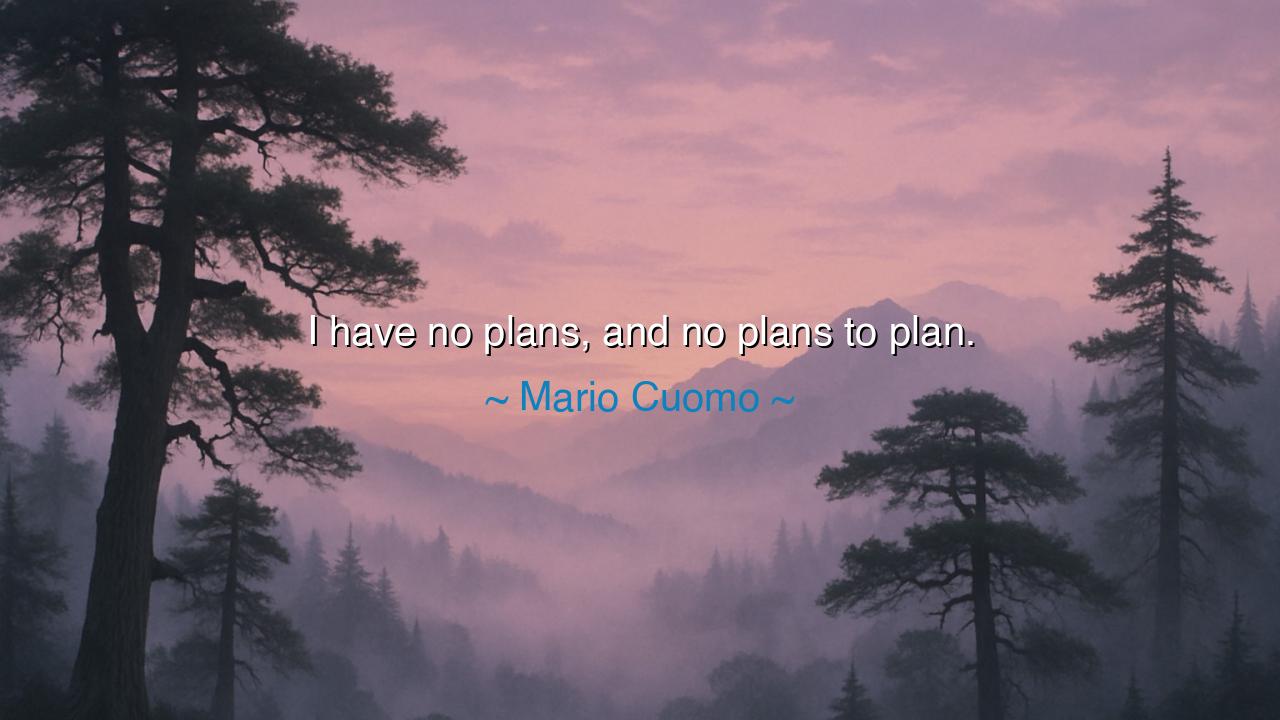
I have no plans, and no plans to plan.






"I have no plans, and no plans to plan." These words spoken by Mario Cuomo may at first seem like a rejection of structure and foresight, yet they carry a deeper wisdom about freedom, adaptability, and living in the moment. The statement speaks to the profound truth that while planning is often seen as the path to success, it is also the case that too much rigidity in our lives can prevent us from responding to the unpredictable nature of life. Cuomo’s assertion invites us to reflect on the power of spontaneity and the beauty of uncertainty, encouraging us to trust in the flow of life rather than trying to control it.
In the ancient world, philosophers like Socrates and Epicurus believed that the best way to live was not to be constrained by elaborate plans or external expectations, but to live in harmony with the present. Socrates, who famously declared that "the unexamined life is not worth living," still recognized that one could never truly plan for every eventuality, for life itself is an unfolding journey. Socrates lived his life with a kind of purposeful spontaneity, questioning and challenging the world around him, but never fully planning or controlling the outcome. His commitment was not to a specific goal but to the constant pursuit of wisdom, a journey that could not be defined by rigid plans or timelines.
Similarly, the Stoics, like Marcus Aurelius and Seneca, often spoke of the need to accept the present moment and respond to life's challenges with equanimity. Aurelius, in his Meditations, reflected on the uncertainty of life and the importance of being flexible in the face of the unknown. For the Stoics, plans were not to be abandoned entirely, but rather understood as temporary guides, not rigid paths. Seneca taught that we should not be enslaved by our desires or plans for the future but should remain focused on our virtue and integrity in the present. In the Stoic worldview, it is not the outcome that defines us, but how we respond to the challenges life throws our way. Cuomo's words are an echo of this ancient wisdom, reminding us that the essence of life lies in adapting to the present rather than being trapped by the expectations of the future.
Cuomo’s rejection of strict planning might also be understood as a call to embrace the mystery of life. Consider the story of Christopher Columbus, the great explorer who, when setting out on his famous journey to the Americas, had no exact map or detailed plans of the new world. Columbus was driven by a vision—to find a new route to the East—but his journey was filled with uncertainty, discovery, and unforeseen challenges. His lack of rigid plans was not a lack of ambition, but a willingness to face the unknown, to explore without knowing every detail ahead of time. His openness to the uncertainty of the future allowed him to find a path that no one could have anticipated. The lesson here is clear: sometimes, the greatest discoveries come from letting go of the need for complete certainty and being open to the possibilities that arise in the absence of a set plan.
This kind of freedom—the ability to live without the weight of rigid expectations—can be a powerful force in our own lives. In today’s world, we are often taught to plan for the future, to set goals, and to prepare for every eventuality. However, the constant pressure of planning and over-scheduling can leave us feeling like we are merely following a script, rather than living freely. Cuomo’s words remind us that living spontaneously does not mean abandoning responsibility or purpose, but rather embracing the fluidity of life and recognizing that serendipity and opportunity often arise when we let go of the tight grip on the future. To live without a plan is not to live without direction but to allow life to unfold naturally, responding to it with open-mindedness and grace.
The lesson here is profound and speaks to the balance we must strike between intention and flexibility. Planning can be useful, but it should not become an anchor that prevents us from living fully in the moment. To live without plans is to embrace the unpredictable and to trust that life will unfold as it will. Yet, this freedom is not an invitation to recklessness but a call to engage with life with open arms, ready to adapt to whatever comes our way. Just as the ancient philosophers did, we too must learn to welcome uncertainty and to find peace in knowing that we cannot control everything—nor should we try to.
In your own life, ask yourself: Are you too attached to your plans? Are you so focused on the future that you are missing the richness of the present? Consider the wisdom in Cuomo’s words and practice letting go of the need to control every aspect of your journey. Embrace the uncertainty, and trust that the future will unfold in its own time, just as it has for those who have gone before us. The greatest discoveries, the most fulfilling moments, often come not from meticulous planning, but from the willingness to step into the unknown and embrace life as it comes. Live not bound by rigid plans, but free in the knowledge that the best parts of life are often those that come when we least expect them.






AAdministratorAdministrator
Welcome, honored guests. Please leave a comment, we will respond soon